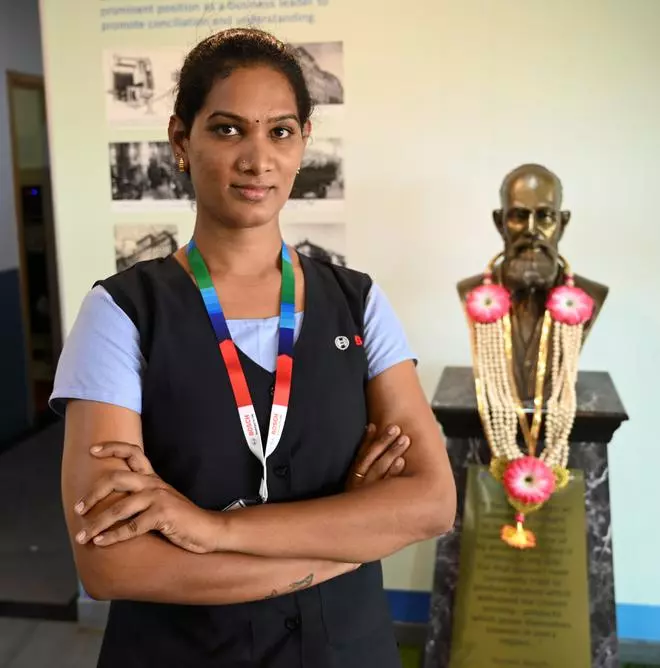“I was quite tense initially. The thought of working in a factory filled with huge machines was scary,” says 27-year-old Sornakani, a manufacturing operator at Bosch India’s plant in Gangaikondan, Tirunelveli district, in the deep south of Tamil Nadu, as she remembers her first few days as a new recruit back in 2017. “But, gradually, I understood that these machines are nothing to be scared of and that women are perfectly capable of operating them. After all, most of the workers around me are women,” she says.
A snek-peak into the factory
Set up in 2015, the plant’s shop floor is dominated by women, who make up 80 per cent of its workforce. GanP, as the Gangaikondan plant is popularly called, ranks second in shop-floor diversity among all of Bosch’s plants in India; at the top is the Oragadam plant, near Chennai, with its all-woman shop floor.
Most of the women at GanP are from the neighbouring villages. “I have studied up to class XII and joined the company in 2015. At that time my children had just started going to school and my husband and I were finding it difficult to make both ends meet,” says Rageena, a machine operator. She decided to take up the factory job to help increase her family income.
All recruits receive rigorous training before being deployed on the job, she says. “The training made things smoother for me. The work timings ensure that I can send my children to school and spend time with them in the evening.”
Boosting production
GanP manufactures automobile parts including electronic throttle bodies, accelerator pedal modules, fuel supply modules, ignition coils, pressure sensors, temperature sensors, rotational speed sensors, fuel return lines and fuel charge assemblies.
In the first year, only 37 per cent of the plant’s manufacturing workforce was female. Subsequently, more women were hired from villages and towns in and around Tirunelveli. Prashant Pareek, Senior General Manager, Technical Plant Head, says this move led to increased productivity. “The growth over the last three years, especially, is amazing. During this period, we relocated the production of six products to this plant, even from international locations. We also noticed a trebling of productivity,” he says, crediting the plant’s female workforce with higher learning ability and commitment.
The employees are also constantly encouraged to come up with ideas to solve existing problems. “We proactively encourage the practice of idea incubation. Winning ideas have been presented at regional events and have also gone on to represent Bosch on national platforms,” he says, adding that five to six ideas are generated on a daily basis at the plant.
Gender goals
Bosch India’s annual report shows that the company aims to have a 25 per cent female workforce across the board. “In terms of gender diversity in our manufacturing sector, we currently align with the industry average, which typically ranges from 8 per cent to 10 per cent. As a large organisation, we are currently at the 10 per cent mark,” says Suresh BR, Country Head HR, Bosch India.
Of the nearly 36,000-strong Bosch workforce in India, over 20,000 are in its software unit, with women making up 33 per cent of this segment, he says. About 25 per cent of the company’s board of directors and 16.7 per cent of its key managerial personnel are women.
Suresh says the workforce’s gender ratio varies from plant to plant. “The level of female representation depends on the specific location and the nature of the plant operations,” he says. At its plants in Tamil Nadu — namely Gangaikondan, Chennai and Oragadam — the female workforce composition is 60-95 per cent; in other states, it is 5-30 per cent. “This variation can be attributed, in part, to the local ecosystem and legislative factors. It’s worth noting that Tamil Nadu has been forward-thinking in establishing an ecosystem that not only benefits Bosch but also encourages other organisations to embrace the opportunity of a more substantial female workforce presence,” Suresh says.
At the same time, he admits that setting up a predominantly female workforce was just one among several business factors at play. “Our ultimate decision to locate this plant [in Gangaikondan] was based on a careful balance of these considerations, ensuring both operational efficiency and the possibility of a strong, diverse workforce,” he says.
Crossing barriers

Durga Devi, a transwoman employee at the Bosch plant in Gangaikondan, Tirunelveli | Photo Credit: Bijoy Ghosh
The female workforce at the plant includes Durga Devi, a transwoman, who joined in 2022. “Since the time I came out as a transwoman, I’ve been ostracised by my family. I completed my education staying with the transgender community in Tirunelveli,” she says. While she was initially worried about facing discrimination at the workplace due to her trans identity, things have been quite smooth for her. “The training at the plant was also quite helpful,” she says. Clearly, women power at Bosch boosts not just productivity but diversity as well.







Comments
Comments have to be in English, and in full sentences. They cannot be abusive or personal. Please abide by our community guidelines for posting your comments.
We have migrated to a new commenting platform. If you are already a registered user of TheHindu Businessline and logged in, you may continue to engage with our articles. If you do not have an account please register and login to post comments. Users can access their older comments by logging into their accounts on Vuukle.